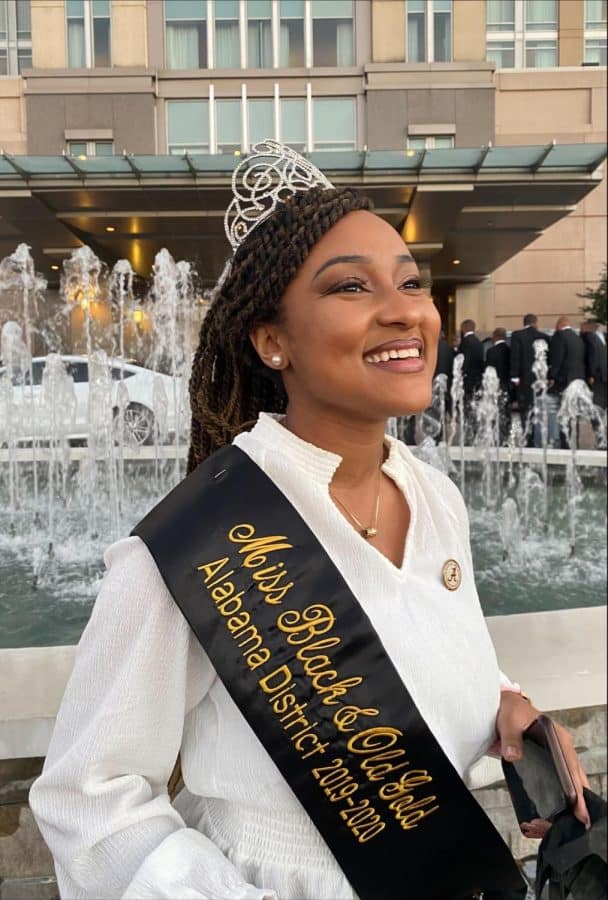More than a crown
Farrah Sanders wins Miss Black and Old Gold.
October 21, 2021
Pageants and homecoming courts may seem cliché, but there is a message behind the pursuit for royalty. Former UA students Tiara Pennington and E’talia Shakir, along with current student Farrah Sanders, broke stereotypes when they pursued the crown.
All three women showcased Black royalty in unique ways by advocating for a cause, displaying sisterhood and sharing an impactful message.
Each woman had her own different reasons for competing in pageants or running homecoming court. Yet they all shared the desire to be an inspiration to others.
Pennington held the title of Miss Alabama 2019 and 2020. She said that her initial interest in pageants was the possibility of winning scholarship money. The financial incentive eased college expenses while also giving Pennington a chance to showcase her opera talents.
The year that Pennington won the title, she also won the overall talent award, which is her favorite phase of competition. Not only did she enjoy competing, but she also loved the true friendships and bonds that she made throughout the Miss America Organization.
“We do our makeup with each other, we don’t try to sabotage each other, we really understand that all of us have worked so hard to get here at this moment, and so we all should just be uplifting each other,” Pennington said.
Along with a strong sisterhood, Pennington has support from various other people. One group of people that supported her were the people she was also able to represent, Black women. Pennington made history when she became the first Black woman to win Miss University of Alabama in 2019.
Pennington wanted to inspire others who were timid about being involved with pageantry. She said every girl who was involved with the program has enjoyed the experience. The Miss America Organization provides a crown to the winner, and the crown can give women a voice.
Pennington promoted her platform, Psoriasis Take Action Alabama. She also advocated for diversity within the Miss America Organization itself.
“We are more than just beauty queens. We’re more than just pageant girls,” Pennington said. “This organization is filled with some of the most intelligent young women you will ever meet in your whole entire life.”
Pennington’s thoughts are echoed by the current Miss Black and Old Gold, Farrah Sanders. Sanders won the title in 2019 and viewed her crowning as an opportunity bigger than herself.
“Miss Black and Old Gold means another avenue of advocacy for me, and to me it offers a space to be able to represent my student body, my community of Tuscaloosa, my community of UA, my state of Alabama,” Sanders said.
Sanders’ involvement in the Miss Black and Old Gold pageant began between conversations with friends in Alpha Phi Alpha Fraternity, Inc. who suggested she compete. She was initially apprehensive due to personal health struggles, but still decided to compete.
Because of this decision and Sanders’ resulting win, she felt a pride and connection with her audience.
“That was the first time that I felt somewhat like myself, and so I looked at that, and I said ‘Wow. I know I’m not the only Black woman that feels like that.’ I know I’m not. This isn’t some singular experience,” Sanders said.
Sanders expanded on her platform of mental health following her win through her organization, My Mind Matters. Focusing on the mental health of women of color along with societal expectations, this platform spoke to these challenges and the importance of mental and physical health.
Sanders’ personal connection was strengthened when she considered how her position as Miss Black and Old Gold is viewed through the eyes of others, particularly young girls of color.
“Having them see a physical embodiment of someone that they haven’t seen before, and being able to come up to little girls and be that inspiration,” Sanders said. “Having them say ‘I want that. I want that crown like yours.’ … And it means being able to inspire, being able to advocate and being able to be present for the body and community of people that I love and respect so much.”
From the impact on young girls to the campus community, Sanders’ victory felt inclusive of everyone. Sanders was reminded that her title went beyond her initial pageant win. She felt the pride and support from the Black community of the University as a representative of them and other students across the nation.
“That in this moment, it was like we all felt seen, and I think they trusted me enough to know that I will continue to help you feel seen even with this crown,” Sanders said.
E’talia Shakir was on The University of Alabama’s homecoming court in 2019. Shakir was the only minority candidate and wanted to be a strong representative for other minorities. She represented her sorority, Delta Sigma Theta, and other historically Black Greek-letter organizations.
Shakir was pleased with the amount of love and support she got from Alabama’s Panhellenic Association. They were able to support and help her impact others, regardless of the organization she was a part of. Being a minority, she appreciated the support she got and she wanted to give back to others who looked like her.
“I was the only minority on homecoming court in 2019, and so I thought of it more [as] I was there representing people or women that look like me, and that was a huge thing,” Shakir said. “I was also in Capstone Men and Women, so getting questions in terms of recruiting at Alabama and what it is like being a minority at Alabama meant a little bit more when I thought of it in that way.”
Along with the image she is projecting to others for encouragement, Shakir was also receiving her own through her network of self-described, “Bama Mamas.” This was a group of women, composed of her advisor and Kim Pettway, who offered support in the midst of stress.
Shakir’s support from the campus community went deeper with her outlook on being supportive and helpful to the next generation of participants.
“You’re always leaving the door open for the people behind you,” Shakir said. “As you’re accomplishing, knocking down these new doors, these new barriers, always make sure you have that one hand extended behind to kind of pull the people up with you.”
These three queens inspired others who look like them to also showcase Black royalty.
Through support, sisterhood and the ability to advocate for a cause, these women have shown that it is much more than just a sparkly crown at stake.
Farrah Sanders is the culture and lifestyle director at Nineteen Fifty-Six Magazine.
This story was published in the Legacy Edition. View the complete issue here.
Questions? Email the Culture desk at culture@thecrimsonwhite.com.




















